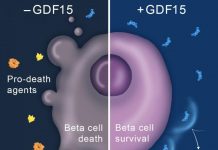May 2007 - An older type of long-acting insulin is as effective in treating type 2 diabetes as newer and more expensive kinds, according to the results of a recent systematic review. However, the newer medications may cause fewer problems with low blood glucose while patients are sleeping.
People with type 2 diabetes who need insulin take once-a-day insulin for longer-lasting or "basal" control. (The review did not cover shorter-acting insulins used to control the blood glucose spike that comes from eating.)
Doctors consider the older medication, NPH, to be the current gold standard for basal insulin. Newer drugs, insulin analogues such as insulin glargine (trade name Lantus) and insulin detemir (Levemir), have been marketed as an improvement over NPH.
However, the reviewers found that Lantus and Levemir were almost identical to NPH in lowering levels of hemoglobin A1c, a widely used measure of long-term blood glucose control.
The eight studies analyzed had enrolled 2,293 people and were published in major medical journals. The studies lasted between 24 and 52 weeks.
Continue Reading Below ↓↓↓
The review appears in the current issue of The Cochrane Library, a publication of The Cochrane Collaboration, an international organization that evaluates research in all aspects of health care. Systematic reviews draw evidence-based conclusions about medical practice after considering both the content and quality of existing trials on a topic.
The reviewers said their study indicated "only a minor clinical benefit" came from using the newer drugs for those with type 2 diabetes when they looked at overnight low blood glucose. They suggested a "cautious approach" when using Lantus or Levemir, at least until longer studies of the effectiveness and safety of the newer medications are completed.
Although NPH is less expensive than the other drugs, the reviewers could not come to any conclusion on cost-effectiveness or the effect of any of the drugs on quality of life. The relative impact on long-term complications such as blindness or kidney failure also was not clear.
"For the patient the good news is that the older medication works very well," said John Buse, M.D., president-elect of the American Diabetes Association. "In most people it will lower blood sugar with little risk of hypoglycemia. The review also shows that Lantus and Levemir had fewer problems with low blood sugar at night, giving greater security for those who experience this while sleeping."
Weight gain when starting insulin treatment is a concern because it can cause some to quit taking the medications if they feel they are getting fat.
"Levemir has been shown to cause less weight gain than NPH in several studies," said Buse, who was not involved with the Cochrane review. Two review studies did find that patients treated with the newer drug gained up to 3.5 pounds less than those on NPH.
Horvath K, et al. Long-acting insulin analogues versus NPH insulin (human isophane insulin) for type 2 diabetes mellitus (Review). The Cochrane Database of Systematic Reviews 2007, Issue 2.
Source: Health Behavior News Service










